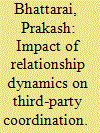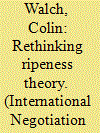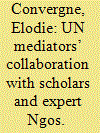|
|
|
Sort Order |
|
|
|
Items / Page
|
|
|
|
|
|
|
| Srl | Item |
| 1 |
ID:
143899


|
|
|
|
|
| Summary/Abstract |
A growing field within mediation research explores issues of third-party coordination. The existing literature highlights third-party coordination as a problematic but extremely important conflict intervention strategy, but lacks an in-depth explanation of fundamental aspects of third-party coordination. Considering this research gap, this study explores a fundamental theme related to third-party coordination: the influence of third-party relationship dynamics. This theme is elaborated by means of an analysis of two case studies: the Maoist armed conflict of Nepal and the Moro conflict of the Philippines. My research finds that power differences among third parties, their attitudes towards each other, differences in intervention strategies and priorities, the nature of conflicts, and the actions taken by the conflicting parties are key contextual factors that influence the dynamics of third-party relationships. Successful coordination is more likely when there is interdependence and a sense of respect between third parties.
|
|
|
|
|
|
|
|
|
|
|
|
|
|
|
|
| 2 |
ID:
143902


|
|
|
|
|
| Summary/Abstract |
Trust is central to international politics. Trust-related theoretical arguments can be divided between rationalist, cultural and psychological schools. We present concise reviews of these approaches, emphasizing the initial trust-creation phase, and apply these factors to our historical case: the emergence of a fragile interpersonal trust between Mikhail Gorbachev and Ronald Reagan before and during their first meeting in Geneva in 1985. Based on archives and first-hand reminiscences, we conclude that the cultural trust theories are not able to contribute much to the initial trust-building process in this particular case, except for explaining the obstacles for trust. The rational approaches explain the necessary but not sufficient conditions for trust to emerge. Ultimately, what triggered the trust that ultimately ended the Cold War cannot be understood without taking into account the cognitive and psychological factors involved in this interpersonal relationship.
|
|
|
|
|
|
|
|
|
|
|
|
|
|
|
|
| 3 |
ID:
143900


|
|
|
|
|
| Summary/Abstract |
How can ripeness theory be extended to explain when and why parties remain at the negotiating table until an agreement is reached? Existing ripeness theory is crucial in understanding when conflicting parties consider negotiation as preferable to continued fighting. However, factors which may explain why parties stay at the negotiation table after the start of the negotiation process – that is, how the ripe moment is sustained until an agreement has been reached – are not well elaborated. This study seeks to extend ripeness theory and argues that organizationally fragmented rebel groups are less flexible to make concessions and unlikely to stay at the negotiation table until an agreement is reached, especially when there is a lack of cohesion between the military and political branches. This argument is explored through a structured focused comparison of the peace negotiations in Colombia and in the Philippines with communist rebel groups.
|
|
|
|
|
|
|
|
|
|
|
|
|
|
|
|
| 4 |
ID:
143898


|
|
|
|
|
| Summary/Abstract |
A turning points analysis is used to capture the negotiating dynamics that occur within the structure of the GATT and the WTO. Ministerial/Council-level operations and Committee-level operations are distinguished. Within WTO Doha Development Agenda negotiations (2001–present), we isolate Ministerial/Council-level data and within GATT, we isolate Committee-level data by examining Trade Related Aspects of Intellectual Property Rights negotiations conducted during the GATT Uruguay round (1985–1994) and at the WTO Doha Ministerial (2001). A detailed chronology of each case is compiled, followed by the identification of precipitants, departures and consequences, which are the three parts of a turning points analysis. We conclude that the precipitants that led to negotiation turning points in the Ministerial/Council environment are exclusively internal and generally procedural. The precipitants creating turning points within the Committee environment are generally internal and substantive. These conclusions have implications for our understanding of international environments and their impact on negotiation process.
|
|
|
|
|
|
|
|
|
|
|
|
|
|
|
|
| 5 |
ID:
143903


|
|
|
|
|
| Summary/Abstract |
UN mediators work more and more closely with academics and expertise-based non-governmental organizations, in particular through the Mediation Support Unit. The Organization appears to genuinely rely on them to conduct mediation and to strengthen its capacity in the area, to the point where it is sometimes difficult to operate a clear distinction between the two types of actors. This article analyzes why the practice of mediation today creates a demand for such expertise-focused cooperation. Beyond the need for flexibility and additional resources, the explanation lies in the prevailing feeling of uncertainty caused by today’s internal conflicts, for which the traditional state-centric lens is becoming irrelevant. In this context, the UN relies on knowledge produced by an epistemic community of peace and conflict scholars, and is embedded in a network of nongovernmental mediators with which it exchanges know-how, following the logic of communities of practice.
|
|
|
|
|
|
|
|
|
|
|
|
|
|
|
|
| 6 |
ID:
143904


|
|
|
|
|
| Summary/Abstract |
Developed mainly in the broad field of negotiation, the existing literature on international business negotiation has adopted theoretical perspectives that focus on differences between negotiating parties. In this article, we argue that opportunism is more fundamental than differences in our understanding of international business negotiation behavior. Parties’ concerns over how to mitigate opportunism are the fundamental force that drives such negotiation behavior, and the likelihood of opportunism is affected mostly by the economic nature of the asset parties committed to the business exchange. By synthesizing transaction cost economics and new institutional economics, this paper develops an alternative theoretical model that complements the existing negotiation literature to explain negotiation behavior. Our model theorizes relationships between parties’ ex-ante credible commitments and ex-post dispute resolution strategies and explores how institutions moderate such relationships in shaping international business negotiation behavior and process.
|
|
|
|
|
|
|
|
|
|
|
|
|
|
|
|
|
|
|
|
|